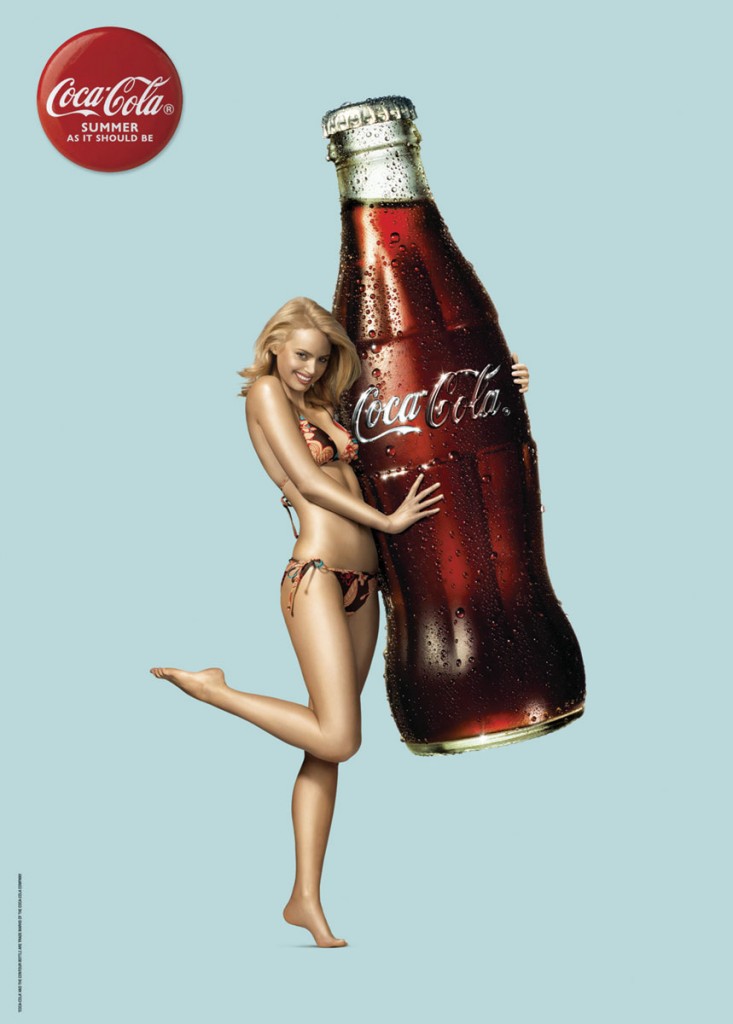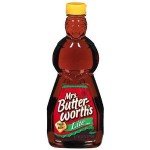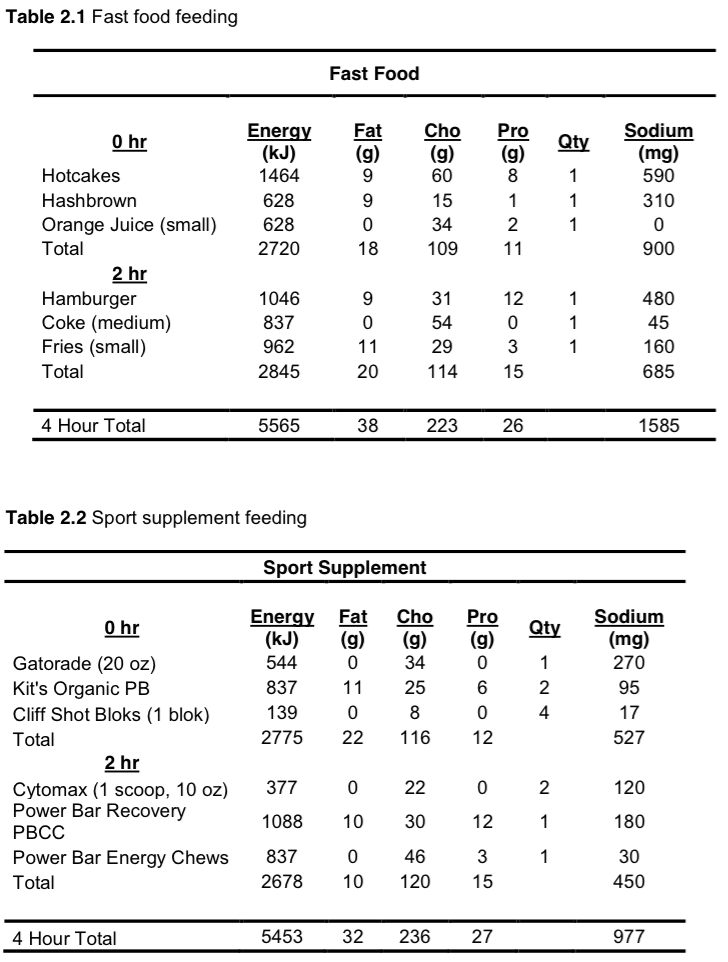By Jose Antonio PhD FNSCA FISSN.
Bite-Sized McNuggets For You To Chew On:
- Studies on fast food and exercise are about as common as finding a walrus in your bathtub playing the trombone.
- If anyone has told you that “they knew this already” or “what’s new with this?,” they’re either full of baloney or Nostradamus’ second-coming.
- This is the first study that has specifically looked at McDonalds food items versus traditional carbohydrate-heavy sports supplements.
- Trained cyclists did a glycogen-depletion ride for 90 minutes.
- To recover, they consumed ~230 g of carbs, 27 grams of protein, and 35 grams of fat. That’s ~920 kcals of carbs, 108 kcals of protein, and 315 kcals of fat.
- Subjects then performed a 20 km (12.4 mile) time trial with no differences between the fast food and supplement groups.
- There was also no difference in glycogen restoration between the groups.
- Fast food is just as good as carbohydrate-heavy sports supplements in promoting glycogen restoration and subsequent exercise performance.
- This study doesn’t mean you should visit the Golden Arches every day.
As a kid growing up in the 70s, it was an absolute treat when my parents crammed all of us into our Vista Cruiser Station Wagon. With no seat belts  and a car full of screaming kids, we headed off to McDonalds for their delicious fries and burgers. Next to watching my favorite show ‘Gilligan’s Island’ (with I Dream of Jeannie a close second) going to McDonalds was the best. It was better than eating cotton candy or playing ROCK ‘EM SOCK ‘EM ROBOTS. And oh, I like Ginger more than Mary Ann. However, in the eyes of communists and clean-eating evangelists, McDonalds represents evil incarnate. Not sure why since nobody has ever been forced to eat the stuff. Heck I’m sure North Koreans would love to have a local McDs instead of starving to death. Let’s fast-forward to a study that was just was published in the
and a car full of screaming kids, we headed off to McDonalds for their delicious fries and burgers. Next to watching my favorite show ‘Gilligan’s Island’ (with I Dream of Jeannie a close second) going to McDonalds was the best. It was better than eating cotton candy or playing ROCK ‘EM SOCK ‘EM ROBOTS. And oh, I like Ginger more than Mary Ann. However, in the eyes of communists and clean-eating evangelists, McDonalds represents evil incarnate. Not sure why since nobody has ever been forced to eat the stuff. Heck I’m sure North Koreans would love to have a local McDs instead of starving to death. Let’s fast-forward to a study that was just was published in the

The ‘Professor’ says to Mary Ann and Ginger: “To determine which of you I like the most, I must conduct a very rigorous scientific trial. And repeat it over and over and over…” No wonder he was the ‘Professor!’
International Journal of Sport Nutrition and Exercise Metabolism. It’s causing quite a bit of angst among the eat clean/squat ‘till you drop/cardio is for sissies crowd. “You mean fast food can actually help you recover?” But but…that can’t be? That’s like saying I can have my cake and eat it too. Now this isn’t an excuse to pig out on burgers and fries at the expense of more nutrient-dense foods. You know what I really love about this study? They measured the one thing that really matters in sports. Performance. Not whether your mood state was better; not whether protein synthesis increased acutely; and not whether some random hormone went up, down or sideways. Performance. In Meghan Trainor’s world it may be all about the bass. But in the sports science world, it’s all about performance. They did a head to head comparison of isocaloric sport supplements (SS) versus fast food (FF) on glycogen recovery and exercise performance. They used 11 well trained men using a randomized cross-over design. The cross-over design is great because it allows each subject to basically serve as his own control. These were young guys (28 years) with 10% body fat that were familiar with moderate aerobic exercise. So no fat boys allowed. You’ll see why.
Each trial included a 90-minute glycogen depletion ride followed by a 4-hour recovery period. Absolute amounts of macronutrients (1.54 g/kg carbohydrate, 0.24 g/kg fat and 0.18 g/kg of protein) as either SS or FF were provided at 0 and 2 hours. See the pic of Table 2.1 and 2.2 from the study. Subsequently, muscle biopsies were collected from the vastus lateralis muscle at 0 and 4 hours post exercise. A 20k time-trial (TT) was completed following the final muscle biopsy.
And the results were what? First of all, they found no differences in the blood glucose and insulin responses. Also, rates of glycogen recovery were not different across the diets (6.9 and 7.9 mmol per kg wet weight per hour for the SS and FF, respectively). But most importantly, there was no difference in time trial performance (34.1 and 34.3 min for SS and FF, respectively).[1]

You’ve got a better chance of finding a gold nugget under your pillow than getting Pauline to eat a Big Mac.
Does this mean fast food is good? In the context of acute recovery following a kick-ass steady-state ride on a bike, it doesn’t seem to matter what the source of your macronutrients are. In fact, an examination of the sports supplements used in this study show that most of them are basically comprised of sugar. Is that really much different than eating a stack of pancakes? Keep in mind that glycogen compensation will occur whether you’re licking Aunt Jemima’s pancake syrup off your plate or eating sweet potatoes. With prolonged endurance exercise, you have a bit more leeway in terms of introducing simple sugars to your diet (post-workout or otherwise). Why? Because you burn more calories than there are Chins in a Chinese phonebook.

Do you remember those big, thick heavy coke bottles? You could kill a Grizzly bear with those bottles because they were so thick and solid.
Coca Cola: This current study reminds me of a prior one published many moons ago. Again using competitive cyclists, they found the following cool results: 1) 6 mg/kg caffeine enhanced time-trial performance 2) replacing a sports drink with Coca-Cola during the latter stages of exercise was equally effective in enhancing endurance performance.[2] So is Coca-Cola the evil twin of McDonald’s burger and fries? Hardly. In the context of prolonged endurance exercise, coke frickin’ helps. And it helps just as well if not more so than the traditional sports drink. Does that mean you should drink Coca-Cola every day? If you answered “No,” go to the head of the class.
Practical advice: This study has little relevance for most athletes. Not many of you are willing to perform steady-state cardio for 90 minutes and follow it with a race (time trial). Even in team sports in which you run a lot (but get to rest), the conditions are quite different. In American football, you only play half the time and have halftime to recover despite the fact that games will last for 3 plus hours. Thus the circumstances that you find with endurance sports (i.e. triathlon, half- to full marathon, etc) are as unique as blue eyes in a brown-eyed world. What this study does demonstrate is that if you consume enough carbs, fat and protein after a very long bike ride, it may not matter what the ‘food’ source is. For those who compete in extreme events such as The Race Across America (3,000 mile bike race from coast coast), the Ironman World Championship in Hawaii (2.4 mile open ocean swim, 112 mile bike, and 26.2 mile run) or the Badwater Ultramarathon (135 mile running race in Death Valley), it’s clear that getting calories is the single most important nutritional consideration. So if you need to eat a stack of pancakes, with a pound of peanut butter, slathered with Mrs.  Butterworth’s pancake syrup (my fav!), then by all means go hog wild. But if your idea of a hard workout is doing 3-5 sets of 10-15 reps of the back squat, leg press, push press, leg extension, leg curls and calf raises, then you probably don’t need all those calories. Heck, a 20-40 gram protein shake post-workout will do you fine.
Butterworth’s pancake syrup (my fav!), then by all means go hog wild. But if your idea of a hard workout is doing 3-5 sets of 10-15 reps of the back squat, leg press, push press, leg extension, leg curls and calf raises, then you probably don’t need all those calories. Heck, a 20-40 gram protein shake post-workout will do you fine.
Final Thoughts: The beauty of science is that it doesn’t care how you feel. If new data comes along that refutes commonly held beliefs, then it’s time you change your beliefs. Otherwise, you may as well just make some random stuff up and just say “I’m right because I say so.” So whether you like it or not, the data from this study shows that fast food can indeed play a role in recovery and performance during  prolonged endurance exercise. However, don’t conflate health and performance.
prolonged endurance exercise. However, don’t conflate health and performance.
To wit:
- Nobody is recommending that fast food be an integral part of your daily food/beverage intake.
- In the context of acute exercise, it may indeed help. So why choose supplements? Convenience.
- I mean do you really want to stick burgers and fries down your pants and eat them later?
- Or would it make more sense to eat that sugar-filled energy bar that’s in a wrapper and won’t give you the runs while you run?
- This study doesn’t apply to those whose primary goal is to look puuurrrrty.
BIO – I teach young skulls full of mush at Nova Southeastern University in sunny South Florida. I love sugar, caffeine and other stuff. If loving sugar and caffeine is wrong, then I don’t want to be right.
I Dare You to Read These Studies on McDs and Coke
1. Cramer MJ, Dumke CL, Hailes WS, Cuddy JS, Ruby BC: Post-exercise Glycogen Recovery and Exercise Performance is Not Significantly Different Between Fast Food and Sport Supplements. Int J Sport Nutr Exerc Metab 2015.
2. Cox GR, Desbrow B, Montgomery PG, Anderson ME, Bruce CR, Macrides TA, Martin DT, Moquin A, Roberts A, Hawley JA, Burke LM: Effect of different protocols of caffeine intake on metabolism and endurance performance. J Appl Physiol (1985) 2002, 93:990-999.


 hypoglycaemia and, as a result, limiting exercise capacity. In light of this, attention should be focused on nutritional interventions that aim to maximise endogenous glycogen stores (liver and muscle) before training sessions or competitive events. This strategy should allow training to be commenced with optimal glycogen stores that can be maintained throughout the exercise bout. The proposed mechanisms that explain exogenous carbohydrate supplementation include a muscle glycogen “sparing” effect (Tsintzas & Williams, 1995) and the maintenance of high blood glucose oxidation rates (Coyle et al, 1986).
hypoglycaemia and, as a result, limiting exercise capacity. In light of this, attention should be focused on nutritional interventions that aim to maximise endogenous glycogen stores (liver and muscle) before training sessions or competitive events. This strategy should allow training to be commenced with optimal glycogen stores that can be maintained throughout the exercise bout. The proposed mechanisms that explain exogenous carbohydrate supplementation include a muscle glycogen “sparing” effect (Tsintzas & Williams, 1995) and the maintenance of high blood glucose oxidation rates (Coyle et al, 1986). commencing training with “low” muscle glycogen leads to enhanced training adaptations when compared with “normal” glycogen levels. (Hansen et al, 2005; Yeo et al, 2008; Hulston et al, 2010) including increases in resting muscle glycogen, citrate synthase activity and the rate of whole body fat oxidation. In spite of this, however, it is important to critically assess; what are the “costs” of training with “low” glycogen levels and how can these be minimized?
commencing training with “low” muscle glycogen leads to enhanced training adaptations when compared with “normal” glycogen levels. (Hansen et al, 2005; Yeo et al, 2008; Hulston et al, 2010) including increases in resting muscle glycogen, citrate synthase activity and the rate of whole body fat oxidation. In spite of this, however, it is important to critically assess; what are the “costs” of training with “low” glycogen levels and how can these be minimized?

